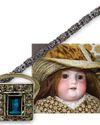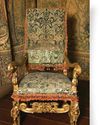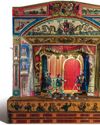
Damask trickled into Europe from China and the Byzantine and Islamic empires in the early Middle Ages. It was in silk; a cloth no one in Europe had seen before and a weave no one knew how to replicate. This intriguing interplay of warp and weft was developed in China, certainly by the 7th century. Using just one yarn colour, it created pattern by combining two different weave techniques that set areas of plain matt weave against areas woven in glossy sateen. Single-colour damask was, and still is, reversible; the pattern can be seen with matt motifs framed by sateen, or the other way round.
Damask takes it name from the Syrian capital, Damascus, a weaving and trading city, and a convergent point on the Silk Road. These various routes first brought cloth and much else to the Mediterranean from China and countries in between, including ones we know as Afghanistan, Iraq, and Pakistan. By the 9th century, damask weaving had arrived in Sicily and Spain following Islamic victories there, and it was taken to Italy when weavers from Sicily were brought to the city of Lucca in the 12th century, bringing their knowledge of damask weaving and designs.
This story is from the {{IssueName}} edition of {{MagazineName}}.
Start your 7-day Magzter GOLD free trial to access thousands of curated premium stories, and 9,000+ magazines and newspapers.
Already a subscriber ? Sign In
This story is from the {{IssueName}} edition of {{MagazineName}}.
Start your 7-day Magzter GOLD free trial to access thousands of curated premium stories, and 9,000+ magazines and newspapers.
Already a subscriber? Sign In

Lisa Coppin
The Cotswold Company’s chief creative officer shares the pieces that mean so much to her

TRAVEL
Six of the best pineta, plus a festive trip to Covent Garden. Review of The Orange, Belgravia by Katie Pike, travel stories

OLD SHEFFIELD PLATE
Stumbled upon by chance, this ingenious material was a more affordable option than solid silver, and well-preserved examples are particularly desirable today

Merrily on high
Summoning servants since the 1700s, bell boards create instant English country-house style (even if you don't have any servants). Emma Longstaff dons her pinny

Let it snow
Nostalgic, magical and highly collectable, snow globes are curious objects of wonder that never fail to instil joy

Velvet Crush
Once the preserve of the wealthy, velvet finally touched all levels of society, thanks to advances in its production process

Celebrating in the Stable
Antiques dealer Julia von Hülsen specialises in Gustavian pieces - all of which look perfectly placed in her German home

THE SHOW MUST GO ON
Victorian toy theatres charming and exquisitely designed miniature worlds have inspired theatre royalty for decades. Today, the tradition is being kept alive by a small but talented network of makers

NICHOLAS LEES
The ceramic artist talks to Dominique Corlett about new ways of working with clay and blurring the edges of solid objects

Candy CHRISTMAS
Pastel hues, vintage decorations and bowls of sweet treats: the festive run-up is gloriously joyful at Bettina Færgeman's historic Copenhagen apartment, where there's an emphasis on entertaining...